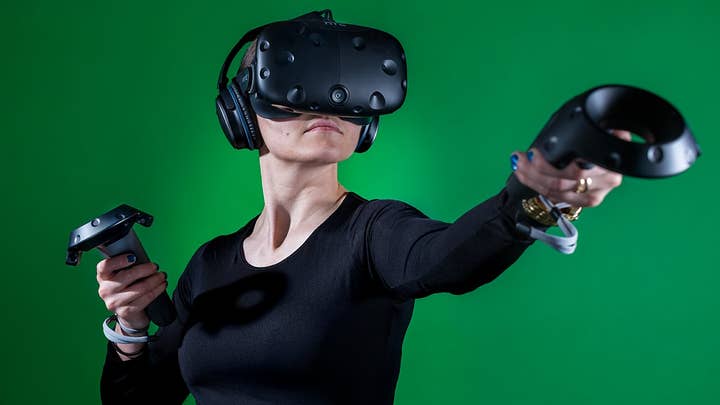Oskar Burman: “Free-to-play will grow, but will never dominate VR”
Former Rovio exec believes virtual reality has a lot to learn from mobile, but won't be ruled by the same type of games
Premium games will always be consumers' first choice when it comes to virtual reality titles, says Oskar Burman.
Speaking at last week's Nordic Game Conference, the former general manager of Rovio and CEO of Fast Travel Games said he does not believe free-to-play will take over the VR market the way it has on mobile - although it will have a significant presence.

"Free-to-play is going to become more common as the userbase grows," he explained. "However, I don't think free-to-play is going to be as dominant as it is on mobile. I think there will be more of a balanced mix. Even if free-to-play is eventually the majority, I still think there's going to be a market for premium games - a little bit like it is on the PC today."
With that in mind, he urged VR developers to build premium games, titles with a set price tag. He said that there is plenty of room to experiment with microtransactions and selling more substantial DLC, but studios certainly shouldn't be afraid to charge for their work - particularly in the higher end of the VR space.
"It just makes sense," he insisted. "If you spent $1000 or more on equipment, on a PC and a VR headset, then you wouldn't mind spending a little bit more to actually buy a couple of good games."
While there's a lot of attention for virtual reality centred around the PC and console experiences, Burman reminded attendees that the target audience on mobile is "definitely higher", estimating it to be close to 10m based on his studio's own research. However, these potential customers cannot be targeted in the same way.
"The audience there, we call them semi-traditional gamers," said Burman. "There are definitely gamers in there but there are also users who are not that familiar with gaming, who just want to try out this new VR thing. They might be trying some games, but also trying a lot of other stuff."
His advice to any studio looking to raise awareness for their VR game was to approach influencers rather than traditional media - "because that's just the way the market is" - and consider promoting them in much the same way they do PC and console titles.

Burman took time to ponder about the changing genres we might see in virtual reality. He attributed the current wave of shorter action, shooter and puzzle games to a combination of the smaller teams and limited budgets behind most releases but expects this to expand as the audience grows. He suggested sports games might become more common, a relatively unexplored genre when it comes to VR, but says sandboxes could provide the real killer app.
"I'm really curious to see what's happening with the creation genre and VR. What's going to be the next Minecraft VR?"
"I'm really curious to see what's happening with the creation genre and VR," he said. "What's going to be the next Minecraft VR? I'm pretty sure we're going to see something spectacular happen in that space."
The talk primarily dealt with learnings VR developers could take from other platforms, with Burman's own experiences in mobile proving to be particularly fruitful. In some ways, VR titles need to be as accessible and instantly gratifying as games for smartphones.
"One thing we have learned is that start-up times really do matter in VR, both on mobile VR and wired," said Burman. "Because if you have a VR game where it's loading and you wait and wait and wait, it really breaks the immersion and takes you out of that experience. There are quite a few games in VR today that do have that problem. Learn from mobile: you have to get the game up and running as soon as possible. Try to avoid long loading times - that's something mobile excels at.
"Another learning from mobile is those short bursts - the player logs in, does some farming and then goes out - that's probably not going to work as well in VR, because it's much more difficult to set up so it doesn't make sense to do a very, very quick burst of gaming."
On the subject of session lengths, Burman shared the results of a study Fast Travel Games carried out into how long players spend with their various platforms. Traditional PC and console games engaged players for between 90 and 150 minutes per session a couple of times per week. Meanwhile, mobile predictably has much shorter bursts of around two to four minutes, with users playing multiple times a day. Virtual reality falls somewhere in between.
"When we looked at VR games with the user studies that we've done, we see that players ideally spend 20 to 30 minutes per session," said Burman. "And they do this with roughly the same frequency as console players.
"Some learnings from this is that gameplay depth is something we can bring over from PC and console. People do want to immerse themselves in the same kind of worlds that they find in traditional games, and the creation of these universes is going to be even more important for VR."
A member of the audience pressed this further at the end of the session, asking if Burman expects VR to cut into the time already spent on traditional PC and console games.
"Yeah, it might eat into that time," he answered. "People have a limited amount of time, and I think we'll see some of those players moving over to VR.
"Mobile VR is a different beast. Mobile gaming is something you do when you're on the toilet. You might do VR on the toilet - I haven't tried it."
